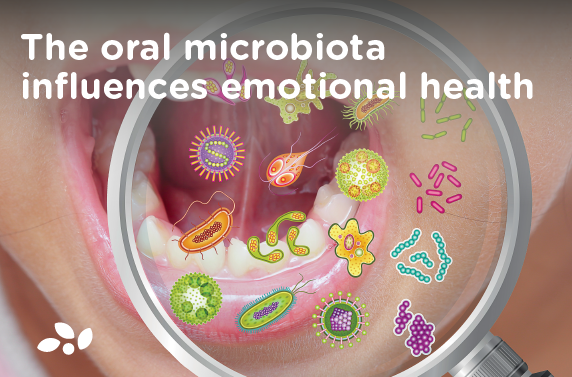At Global Fruselva, we always focus on new horizons related to health, which is why we have a special interest in a little known aspect that has great relevance in the population, such as how the oral microbiome affects mental health.
Mental health is an important issue in people’s lives and one that has become increasingly relevant. According to World Health Organisation data, 12.5% of all health problems are related to mental disorders, surpassing cancer and cardiovascular problems. If we talk about mental health and age, 50% of mental health problems start before the age of 14 and 75% before the age of 18. In addition, it is estimated that more than 300 million people worldwide live with depression and 450 million people are affected by a mental health problem that severely hinders their lives.
In this paper, the researchers focused on analysing the potential impact of the oral microbiome on emotional health. The researchers observed that symptoms of anxiety and depression were associated with differential abundance of specific oral bacterial taxa. It was also observed that a number of bacterial taxa present in both the oral cavity and the gut were associated with depression, which is explained by the overlap and cross-communication between the oral and gut microbiomes. The abundance of oral bacteria has been linked to psychological symptoms, as it has been shown that high anxiety symptoms and cortisol levels are associated with an increased risk of depression and schizophrenia, and have been found to be closely related to the pathology of neuropsychiatric disorders such as depression and schizophrenia, as well as producing a dysregulation of the immune system, which plays an important role in these diseases. With regard to pathogens affecting the oral cavity, they also point out that there are differences between the sexes, both in terms of feeding and fasting conditions, and this was reflected in the fact that there were more significant interactions with emotional state in men than in women.
In conclusion, this study highlights the need for further research into the oral microbiome and its impact on mental disorders to improve understanding of disease pathogenesis, which may lead to new diagnostic targets and early intervention strategies.
A genetic association study reveals the relationship between the oral microbiome and anxiety and depression symptoms
Malan-Müller S, Postolache TT. Editorial: The oral microbiota in mental health. Front Psychiatry. 2022 oct 7; 13:1048179. doi: 10.3389/fpsyt.2022.1048179. PMID: 36276331; PMCID: PMC9585619.
Journal Impact Factor: 5.435 (Q2)
Objective of the study: evaluate the causal relationship between each salivary microbiome, tongue dorsum microbiome, anxiety and depression.
Study design: Mendelian Randomization
Population: participants recruited from The UK Biobank (UKB)
Sample selected: 502.656 participants aged 40-69 from 2006 to 2010 and recorded health information, hospital records, and genetic data of participants.
Publication date: 10 November 2022



